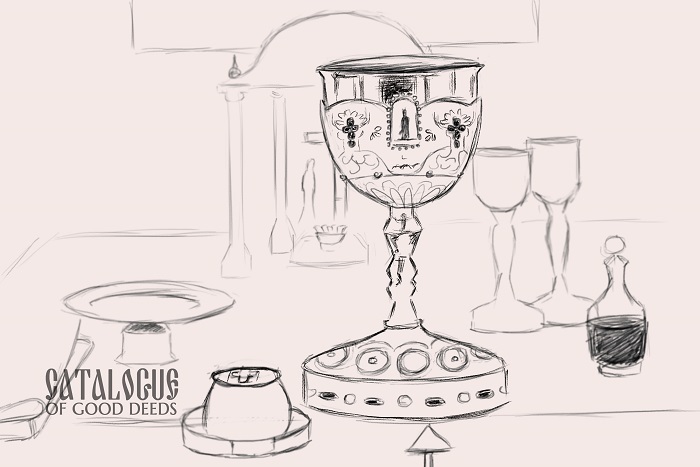
The author of these lines, Dutch by origin, was born in Indonesia. She moved to London when she was young. She converted to Orthodoxy in 1977 when she was studying in Moscow. She discussed the possibility of moving to Russia with Metropolitan Anthony of Sourozh, and waited seven years for his decision. He agreed when he saw that she was prepared for it. Today, Frederica de Graaf works at the First Moscow Hospice.
Think about it: “If you have a ‘why’ to live, you can endure almost any ‘how’.”
Indeed, when there is meaning in suffering, a person can bear almost anything. If you can help someone to go in search of this meaning, they will be able to bear their grief and their suffering with courage and without grumbling. It is very important that each person has to find the meaning of his or her own suffering. Neither you and I, nor anyone else, knows it or can point it out to other people. Besides, this meaning may change over time.
Let me tell you a curious story. Nikolai Ivanovich, an ordinary middle-aged working man, was a patient in our clinic. One day he said to me, “Frederica, I want you to give me an injection.”
“An injection?” I asked. “Do you mean a lethal one?”
“Yes,” Nikolai Ivanovich confirmed, “I can’t take it anymore.”
I told him, “No, Nikolai Ivanovich, we don’t do such things here.”
While he was looking at me with deep disappointment, I asked, “Do you know your patron saint, Nicholas the Wonderworker?”
“I do,” he nodded with dignity.
I am still not certain that he really knew St. Nicholas, but I said, “Then, if you really are tired of being sick so much that you are ready to pass into the other world not only in body but also in soul, ask St. Nicholas to be your intercessor, he knows best.”
Nikolai Ivanovich nodded in agreement. I looked at him – it seemed to me that he was actually pleased. I added, “I will also pray to him for you.”
Two days later, Nikolai Ivanovich quietly died a natural death. This is another example of how suffering turns out to be a blessing in disguise when instead of just lying there, waiting for a meaningless end and not knowing when it will come, a person acquires a goal.
Viktor Frankl (based on his own and other prisoners’ experiences in a concentration camp) believes that one of the most difficult trials for a person is the uncertainty of the term of suffering. If we know that we have to suffer for half a month, a month, half a year or even a year, then we can endure anything. It is much harder to endure suffering without knowing when it will end, and without seeing its meaning.
A request for euthanasia is first and foremost a desperate cry from an aching soul saying, “Help me! I am alone, I am in pain, and I am scared!”
This request does not always show that the suffering person really wants to commit suicide. Often he simply can no longer bear his loneliness, and our personal presence as an individual is of great importance here. When caring for a desperately ill person, it is extremely important to be able to stay calm.
Despair almost always occurs. Try to imagine yourself lying in bed day after day unable to do anything. Such a state may be caused by a stroke, a heart attack, etc. Your loved ones have to take care of you for months. Sooner or later I would feel like a burden, and I think that anyone would experience something similar.
In my opinion, this is especially acute in Russia, where most people have to work hard to make a living. A disabled person who feels like a burden in the family is a real problem, which needs to be discussed. For example, you can ask such a person if he would consider his own sick family member a burden if he was in a reverse situation. One way or another, the feelings of the sick person have to be brought up for discussion.
A person who considers himself a burden should be told that he can have a variety of goals:
First and foremost, he needs to learn to exist under the new reality.
Secondly, he can bring joy to everyone who supports him by accepting with gratitude what is given to him. Instead of saying, “You shouldn’t have bothered to come so late after work,” he can express his gratitude and say, “It’s already so late, but you still came to visit me after work! Thank you so much, it made me feel good.”
This will make his visitor feel appreciated and want to help even more. The responsibility of the sick person lies precisely in the fact that he, too, can give. Frankl wrote that the important thing is not what I can still take from life, but what I can give.
Thirdly, if the sick person believes in God, then his goal may be to pray for all those who surround him and help him, and in general all the living and the dead whom he remembers.
An interesting incident once happened to Metropolitan Anthony in his youth. His spiritual father, monk Athanasius, asked him, “Do you like to pray?”
“Yes, I do.”
“If for some reason you are unable to pray, does it hurt and sadden you?”
“Yes.”
Suddenly Father Athanasius said something really strange. He said, “Then I forbid you to pray for a year! You seem to trust in your own prayers, and not in the mercy of God. When you go to bed, simply remember all those who love you and say: ‘Lord, I thank you for this person! Bless him!’ Remember not only the living, but also the dead. Remember also all the saints whom you love and who love you. After that, relying on their prayers, cross yourself and go to sleep.”
It seems to me that the same can be said to a bedridden person: “Remember all the people who love you, including the departed and the saints. Thank God for each of them and ask Him to bless them.” Unfortunately, in my experience, few people have the desire to pray. I am sure that all of us, while we are still healthy and have the strength, should learn to pray and come to love it. If we are not used to praying, we are unlikely to do it when we are sick, weak, and under the influence of medicines. At the same time, if a person knows the power of prayer and uses it, it brings him a great benefit. Above all, it brings him gratitude, joy and the feeling that he is not alone. Such a person always has someone to talk to and to rely on.
Fourthly, a sick person can become a source of peace, unity and love for his children, grandchildren and all his family, so that they can come and freely tell him about everything that happened to them on any given day. If the patient’s heart is open, and he does not alienate himself, ‘drowning’ in his illness, he has a lot to give.
There is much that a seemingly incapable person can do if he pursues at least one of these goals. This will also help him not to feel like a burden anymore.
Transalted by The Catalogue of Good Deeds
Source: https://foma.ru/chetyre-zadachi-dlja-tjazhelobolnogo-cheloveka-v-chem-smysl-stradanija.html




